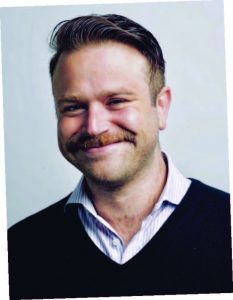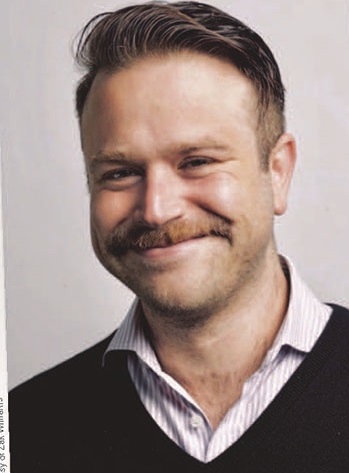On October 27th, mental health advocate Zak Williams shares the virtual stage with Jack Ford at the Trinitas Health Foundation’s Peace of Mind Event. The son of actor and comedian Robin Williams, Zak has focused his entrepreneurial skills on mental health advocacy. He will be sharing his personal story to address the challenges and stigma associated with mental health issues. He is the former Chief Operating Officer of Crossing Minds and Director of Business Development for Condé Nast, and a graduate of Columbia Business School.
EDGE: How would you characterize your approach to mental health advocacy?
ZW: My approach is primarily systems-based— how we think about making a difference across a collection of avenues to ultimately provide a better, more comprehensive approach for individuals and communities.
EDGE: Is that more dependent on top-down or bottom-up strategies as a catalyst for good things to happen?
ZW: It involves taking both a bottom-up and top- down approach. It requires grassroots initiatives—people understanding the needs of people—as well as top-down policy considerations, organizational considerations and considerations in the private sector. Also cultural considerations, which involve both bottom-up and top-down strategies.
EDGE: What does a systems-based approach to advocacy in this space look like?
ZW: I break things down into five categories where change can happen: Programming, which involves development of curricula and potential applications; Experience, which involves mental health awareness and campaigns focused on, for example, reducing stigma; Research, which is done by institutions nationally and abroad; Advocacy, involving strategic thinking and how organizations and different constituents communicate and coordinate around making change; and then there’s Policy, which occurs mainly in the public sector and includes educating policymakers to make pragmatic and thoughtful decisions about crafting policy that ultimately impact their constituents for the best.
EDGE: I hear the entrepreneur in you talking. What strengths do you bring from that realm to this one?
ZW: My role as an advocate bleeds into what I do in the private sector. In terms of how I operate as a business executive, as I said I’m very much a systems-based advocate. I rely upon metrics and data to make decisions. But for me it’s very much about establishing belief systems that impact society, culture and people for the better. You can take an advocacy approach whether you’re in the private sector or the not-for-profit world. It’s just a particular style of management and organization and leadership
EDGE: When you speak at events like the one for Trinitas, is it similar to giving a presentation in front of a group of potential investors?
ZW: It’s exactly like giving a presentation in front of a group of investors. The key thing is tying storytelling to impact and data. If you can tell a story with the numbers, it’s extremely compelling because, at the end of the day, the human element of mental health support and advocacy is absolutely critical. The numbers element helps tell a story at scale. So tying the two together is critical for sustained investment into the category.
EDGE: Because of its proximity to both urban and suburban populations, Trinitas extends its mental health service to a very wide and diverse audience. Is that type of “parity” the focus of most advocacy organizations?
ZW: Yes it is, especially on a policy basis. From a technical standpoint, it can be boiled down to something pretty straightforward, which is providing a foundation for mandating that insurers provide equal coverage around mental health programs. That is extremely important when it comes to providing quality of care. So organizations that take a leadership role within the space of mental health parity are on the vanguard of what mental health support will look like.
EDGE: And what will it look like?
ZW: Expanded services and high-quality care for all constituencies that need it. We’re getting there. Slowly. The California state legislature recently passed a mental health parity law that ultimately mandates that insurers take an egalitarian approach to providing services. People deserve high-quality care across the board, regardless of whether they come from means or they don’t. The more we can think about how to implement that on a systems level, the more people will have access to preventative care, just as they have access to chronic and crisis-oriented care.
EDGE: What role do you think technology will play in moving this forward
ZW: I’m taking Dr. Ronald Kessler’s lens here in terms of how he talks about technology. He’s an epidemiologist and policy expert at Harvard Medical School. He says there are “tech extenders” and “people extenders.” Tech extenders are telehealth platforms that enable care to be extended to places that might not have in-person, offline resources that would enable people to have the quality of care that they need. People extenders would include providing behavioral coaching services and additional social services, whatever they may be, training people to create higher-quality coverage in areas and regions that might not have, say, the level of psychiatrists needed across an entire population. So that might look like behavioral coaches or students or residents that can provide preventative-level care before it becomes a chronic or crisis issue requiring psychiatric interventions. You want to match people to the level of care that’s needed.
 Prepare for Takeoff
Prepare for Takeoff
In 2020, Zak Williams launched a new company, PYM Health. PYM stands for Prepare Your Mind. According to Williams, it is focused on “providing lightweight to middleweight solutions for stress and anxiety,” he says. “Our first product is a chew that contains primarily natural amino acid compounds that provide stress/anxiety support.”
Original Mood Chews are available online through the company’s website and other ecommerce channels. “Ultimately, we hope to be available in stores throughout the nation,” Williams says.
EDGE: What other goals do you have in the area of mental health advocacy?
ZW: The privilege of being able to do the work I do is something that I hope other people will explore. Within the communities that I’m a part of, we hope to empower others to advocate for causes associated with mental health. Ultimately, I hope to support people along their journey and create more communities of advocates that will create change on a systems level. The fact that we’re able to have this conversation, I’m very grateful.
EDGE: Going from “son of…” to “father of…” status is a turning point for a lot of people, whether your dad is a celebrity, as yours was, or not. In what ways has fatherhood changed your perspective?
ZW: When it comes to raising my son, to parenting, it’s caused me to prioritize empathy and openness and understanding. It has certainly changed my perspective in how I think about mental health advocacy and advocating for change. My son is 15 months old. He doesn’t think about mental health, but I am very heartened by how young people think about mental health and the stigma associated with it. I’m 37, which I guess makes me a late-stage Millennial. Generations younger than myself tend to have an openness and orientation toward thinking about mental health as being essential to a balanced and healthy lifestyle. I want to take the long view here, that future generations have an opportunity to remove the stigma and biases associated with mental health and ultimately create a more tolerant society and world.

Photo courtesy of Zak Williams
Zak is on the board of Bring Change to Mind (bringchange2mind.org), a nonprofit founded by Glenn Close, that works to end the stigma and discrimination surrounding mental illness. He’s an advisor for Inseparable (inseparable.us), a national organization focused on creating pragmatic mental health policy.





